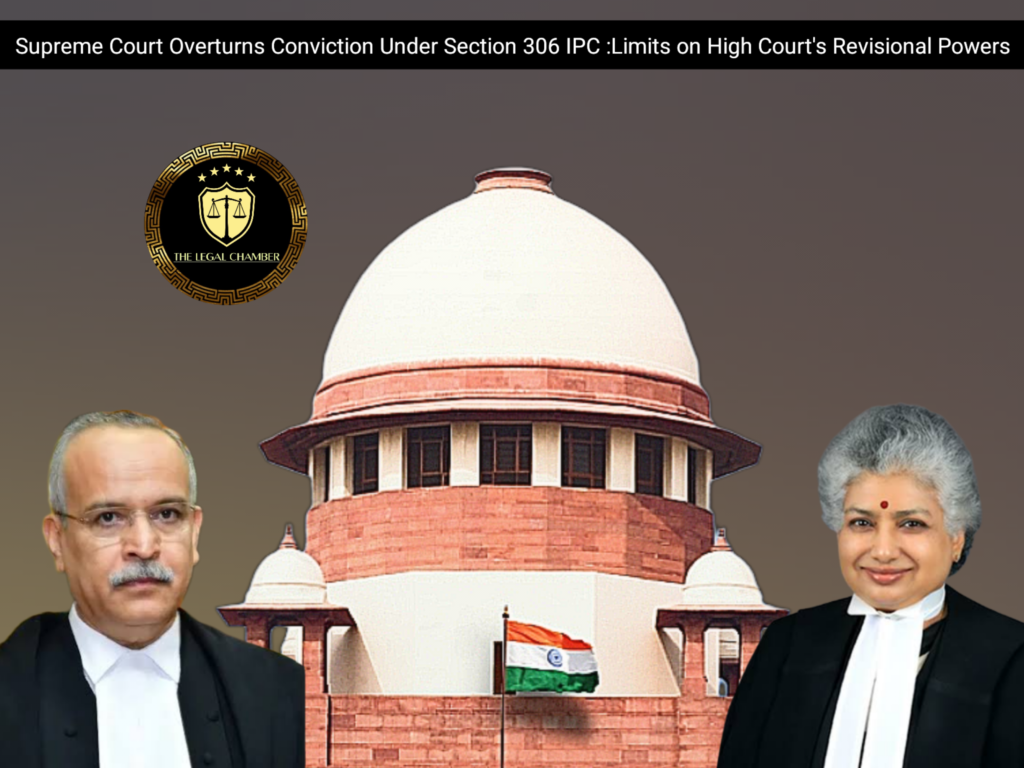
The Supreme Court of India, in Nagarajan v. State of Tamil Nadu, held that in an appeal filed by an accused against conviction, the High Court cannot suo motu exercise revisional powers to enhance the sentence or convict on a charge for which the trial court acquitted the accused, especially when no appeal or revision was filed by the State, victim, or complainant. The Court emphasized the principle of no reformatio in peius, meaning an appellant should not be placed in a worse position as a result of filing an appeal
Facts Of The Case:
Nagarajan, the appellant, was the neighbor of the deceased, Mariammal. On the night of July 11, 2003, the appellant entered Mariammal’s room, hugged her, and attempted to outrage her modesty. Mariammal’s mother-in-law intervened, scolded the appellant, and he fled. The next day, July 12, 2003, Mariammal and her infant daughter were found missing. Mariammal had attempted to take her elder daughter from school but was not permitted. She then went to a nearby field with her infant and committed suicide by consuming oleander seeds, also administering poison to her child. Both were later discovered by a passerby. The child was declared dead at the hospital.An FIR was registered against Nagarajan under Section 306 of the IPC, and a charge-sheet was filed. The Trial Court, the Mahila Court, Fast Track Court, Dindigul, altered the charges to Sections 354 and 448 of IPC and acquitted Nagarajan of the Section 306 IPC charge on May 29, 2015. He was convicted under Sections 354 and 448 of IPC and sentenced to imprisonment and a fine. The Trial Court found that Nagarajan’s actions did not constitute abetment of suicide. Nagarajan appealed his conviction to the High Court. The High Court, observing that the State had not appealed the acquittal under Section 306 IPC, suo motu directed the registration of a criminal revision case to examine the acquittal’s propriety, registered as Crl. R.C.(MD) No. 248 of 2015. The High Court subsequently dismissed Nagarajan’s appeal and allowed the suo motu revision, convicting him under Sections 306 and 448 of IPC and enhancing his sentence. The High Court reasoned that Nagarajan had played an active role in tarnishing the deceased’s self-esteem and instigated her suicide. This led Nagarajan to file the present criminal appeals before the Supreme Court.
Procedural History:
The procedural history began with FIR No. 239/2003 registered against Nagarajan under Section 306 IPC, followed by a charge-sheet. The Trial Court, Mahila Court, Fast Track Court, Dindigul (S.C. No. 54 of 2007), altered charges to Sections 354 and 448 IPC, acquitting Nagarajan under Section 306 IPC on May 29, 2015. He was convicted under Sections 354 and 448 IPC and sentenced to imprisonment and fine.Nagarajan appealed this conviction to the High Court (Crl. A. (MD) No. 137/2015). The High Court, noting the State had not appealed the Section 306 IPC acquittal, suo motu initiated a criminal revision case (Crl. R.C.(MD) No. 248 of 2015) on June 8, 2015, to examine the acquittal’s propriety. An Amicus Curiae was appointed. On November 29, 2021, the High Court dismissed Nagarajan’s appeal and allowed the suo motu revision, convicting him under Sections 306 and 448 IPC, and enhancing his sentence, leading to the present appeals before the Supreme Court
READ ALSO :Supreme Court Rules: GMADA Not Liable for Homebuyers’ Loan Interest in Delayed Housing Project
Court Observation:
The High Court, in its common impugned judgment dated November 29, 2021, asserted that it possessed the inherent power to initiate suo motu revision under Section 401 of the Code of Criminal Procedure, 1973 (CrPC). It observed that the appellant had played an active role in tarnishing the self-esteem of the deceased by outraging her modesty, thereby instigating her to commit suicide, and thus, the offence under Section 306 of IPC was made out. This led the High Court to dismiss the appellant’s criminal appeal and allow the suo motu criminal revision petition, convicting the appellant under Sections 306 and 448 of IPC and enhancing the sentence. The High Court’s action in exercising its suo motu revisional powers to convict the appellant under Section 306 IPC, despite his acquittal by the Trial Court and in the absence of an appeal from the State, victim, or complainant, was a key observation leading to the Supreme Court’s review
Final Decision & Judgement:
The Supreme Court of India ultimately allowed the appeals in part, setting aside the High Court’s conviction and enhanced sentence under Section 306 of the IPC. The Supreme Court confirmed the judgment of the Sessions Court, as affirmed by the High Court, regarding the convictions for offences punishable under Sections 354 and 448 of the IPC. Consequently, the appellant was directed to undergo the sentence and pay the fine as imposed by the Sessions Court. The Court emphasized that in an appeal filed by an accused/convict, and in the absence of any appeal by the victim, complainant, or State, the High Court cannot exercise suo motu revision either to enhance the sentence or to convict the appellant on any other charge. This decision aligns with the principle that an appellant should not be placed in a worse position as a result of filing an appeal (no reformatio in peius). The appellant was directed to surrender to the jurisdictional Chief Judicial Magistrate or concerned Police Station to serve the remainder of the sentence imposed by the Trial Court, with appropriate action to be taken for arrest in case of failure to surrender.
Case Details:
Case Title: Nagarajan Versus State of Tamil Nadu Citation: 2025 INSC 802 Criminal Appeal Nos.: 2892-2893 of 2025 Date of Judgment: June 04, 2025 Judges/Justice Name: Justice B.V. Nagarathna, & Justice Satish Chandra Sharma
Download The Judgement Here